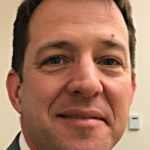Central Health spent more than $111,000 for sponsorships that have nothing to do with providing indigent healthcare
Part 6 in a Series
Updated Saturday March 31, 2018 10:08am to correct date errors
Central Health, the Travis County agency that levies property taxes to pay for indigent healthcare, has spent more than $111,000 to sponsor various community events in fewer than four years. Much of that money put Central Health in the spotlight as it laid out cash for lavish galas at high-end hotels that included fine food, entertainment, and awards presentations.
As the above photo shows with Central Health Board of Managers member Rosie Mendoza, some events were attended by Central Health board members and executives. It is not clear whether these attendees paid to attend or their tickets were included in the sponsorships. The managers and Central Health Board of Managers who would know have declined to comment.
More than $50,000 of that $111,000-plus in spending went to sponsor multiple events for Austin’s Healthiest Employers Awards presentations, the Austin Business Journal’s annual event that recognizes employers who provide programs for the health of employees. Of that amount $30,000 was paid in 2013 to be the “presenting” (or major) sponsor for the event. (Other expenditures large and small will be detailed later in this story.)
These expenditures are totally unrelated to Central Health’s sole mission: to provide indigent healthcare services. In fact no other Travis County governmental agency is permitted to provide that care, nor is the State of Texas allowed to fund it. If Central Health abandons its fiduciary responsibility to the uninsured, underinsured and poor, then its stewardship to taxpayer dollars has run amok.

Mike Geeslin, president and CEO of Central Health since May 15, 2017, declined to address these expenditures in an interview with The Austin Bulldog Wednesday, October 28, 2018 Tuesday, March 27, 2018, or to answer numerous other prepared questions related to these expenditures—even though nearly $11,000 of the total was spent since he took this job May 15, 2017.
Geeslin would not even characterize these expenditures as inappropriate and would only comment on a new policy going forward (more about that later).
So what’s the big deal with a government agency being a sugar daddy for handouts to fund things so people can go have a good time, a good meal, and pat backs over the good works they’ve achieved?
It’s only chump change, right?
Okay, admittedly the total spent over the course of these years wouldn’t amount to so much as lint in the deep pockets of an agency whose budget in the last two years totaled nearly a half-billion dollars—more than $351 million of that coming from local property taxes.
The least favorable view of these expenditures, however, is they reveal either an ignorance of, or a careless disregard for, the limitations imposed by the Texas Constitution, state statutes, attorney general opinions, and case law (more about these later).

Attorney Fred Lewis is a longtime critic of how the agency spends money for purposes he views as improper or illegal. After the Travis County Commissioners Court failed to heed his criticism, and that of fellow attorney Robert “Bob” Ozer, to order Central Health to implement financial policies that required more accountability, Lewis filed a lawsuit October 18, 2017, over alleged misspending of funds. (Birch et al v. Travis County Healthcare District dba Central Health and Mike Geeslin in his official capacity only, Cause No. D-1-GN-17-005824.)
Action in the litigation is ongoing with the parties conducting discovery, Lewis told The Austin Bulldog.
While the lawsuit was aimed squarely at challenging Central Health’s authority to give $35 million a year to the University of Texas at Austin Dell Medical School—and to continue that annual allocation in perpetuity—Lewis and other critics had been vocal for years about these allocations and other spending.
Regarding the expenditures detailed in this story, Lewis said, “They don’t seem to understand they are a governmental organization and they seem to think it’s their private piggybank and they can spend anyway they want.”

“The problem with these things is not so much the level of funding but it is still significant. It’s what it symbolizes in the complete mismanagement and disorganization of a governmental structure,” Ozer said in a phone interview this morning.
“The agency has no idea what its responsibilities are under the law. Their misunderstanding of their legal responsibilities vis-a-vis the indigents is so great they’re giving way $35 million a year to the University of Texas Dell Medical School in violation of the statutes. Their misunderstanding is so great they signed off on privatization of the Dell Seton Medical Center, a teaching hospital that cost taxpayers $32 million to $34 million a year in lost rent for the old Brackenridge Hospital.”

After examining the list of expenditures, Austin attorney Bill Aleshire of AleshireLaw PC said, “That is just more evidence that Central Health is not thoroughly focusing taxpayer money to maximize giving health care to poor Travis County residents.
>“Instead,” the former Travis County judge said, “leadership at Central Health, with the acquiescence of the Commissioners Court, is letting Central Health be a pot of gold for special interests.”
Where did the money go?
In addition to the $50,500 spent for Austin Business Journal events, more than $21,000 went to a trio of chambers of commerce to sponsor galas and luncheons.
Central Health donated $15,000 to sponsor tables at the American Heart Association’s Heart Ball for three years at $5,000 per year.
 Central Health paid for a mélange of other events including $5,000 to sponsor the Central Texas Chapter of the National Forum for Black Public Administrators; $1,000 for Viva Streets!, in which a mile of a city street became a car-free playground; sponsored a $1,000 table at Congress for the New Urbanism luncheon; $500 to be a hole sponsor for the Austin Area Urban League’s Soul of the City Golf Tournament; $1,000 for the Dove Springs Advisory Board’s Employee School Supplies Drive; and much more.
Central Health paid for a mélange of other events including $5,000 to sponsor the Central Texas Chapter of the National Forum for Black Public Administrators; $1,000 for Viva Streets!, in which a mile of a city street became a car-free playground; sponsored a $1,000 table at Congress for the New Urbanism luncheon; $500 to be a hole sponsor for the Austin Area Urban League’s Soul of the City Golf Tournament; $1,000 for the Dove Springs Advisory Board’s Employee School Supplies Drive; and much more.
The $111,000 total does not include the cost for several other events in 2017 that were left out of the agency’s response to a public information request and for which spending figures have not yet been obtained. A request for that additional information is still pending.
The Austin Bulldog constructed a spreadsheet (linked at the bottom of this story) that lists each of the expenditures to include which organization was funded, the date, amount, name of the event, a description of the event, and links to more information about each line item.
If this spending were legal would county attorney have put on the brakes?
These payments appear to have been made in violation of Texas Constitution Article III Section 52(a), which states:
“Except as otherwise provided by this section, the Legislature shall have no power to authorize any county, city, town or other political corporation or subdivision of the State to lend its credit or to grant public money or thing of value in aid of, or to any individual, association or corporation whatsoever, or to become a stockholder in such corporation, association or company.” (Emphasis added.)
Further, the courts have ruled in at least two lawsuits that the provisions of Article III Section 52 “bar donations of funds from one governmental entity to another, as well as donations from governmental entities to private entities.” (Emphasis added.) (Harris County Flood Control District v. Mann, 140 S.W.2d 1098 Texas 1940; San Antonio Independent School District v. Board of Trustees of San Antonio Electric and Gas System, 204 S.W.2d 22, Texas Civil Appellate Court El Paso 1947.)
Texas Attorney General Opinion GA-0076 issued May 7, 2003, states: “However, an expenditure of public funds for a public purpose is not prohibited.”
But what public purpose is served when an agency—whose sole mission is to provide indigent healthcare services—sponsors events, many of which are lavish and at considerable cost, that have no apparent benefit for the care of indigent residents of Travis County?
It is abundantly clear these events had little or no public benefit because the Travis County Attorney’s Office put a halt to the practice.
That happened just nine days after Lewis filed a lawsuit against Central Health October 18, 2017, over alleged misspending of funds.
The new policy limits sponsorships to $500 max
An Geeslin’s request Assistant Travis County Attorney Holly Gummert emailed Central Health executives and laid out the new policy. (Copy linked below.)
The email states, “Mike (Geeslin) asked that I communicate a change in practice, to be effective immediately, concerning the use of funds for specific types of outreach and education activities. This change incorporates legal advice from the Travis County Attorney’s Office and is being implemented by the Executive Office of the President & CEO upon my recommendation.” (Emphasis added.)
The policy requires that requests for outreach and education efforts that require a contribution or expenditure of funds to an outside organization be routed through Geeslin’s office for approval. Such expenditures will be limited to $500 but could be less depending on the event and organization.
The policy states: “Central Health may participate in an event or contribute to an organization” if the event or entity:
• Serves an outreach or educational purpose
• Benefits the population served by Central Health
• Encourages diversity and inclusion or local sourcing in contracts for services with Central Health
• Focuses on alleviating a known disparity or inequity that relates or facilitates Central Health’s mission
• Affords Central Health or its enterprise partners the ability to educate the community about our work or how we serve the community.
“I believe we have broad discretion on how to best fulfill our mission,” Geeslin told The Austin Bulldog in the Wednesday Tuesday interview.
Geeslin also emailed later that day to add, “To be clear, the policy was intended to address requests made during or after October 2017. If a sponsorship amount was committed to prior to the policy, it would have been honored.”
Potential conflicts of interest
Two members of Central Health’s Board of Managers also were on the boards of chambers of commerce that received funding for sponsorships in multiple years.
Both board members subsequently received awards from those chambers of commerce.
Both are highly accomplished and widely recognized for their professional achievements and numerous contributions to community service.
Nevertheless, Central Health’s financial sponsorships of other organization events that involve Central Health board members raise an issue about potential conflicts of interest. The board members are Clarke Heidrick and Rosie Mendoza.
Clark Heidrick

Robert Clarke Heidrick Jr. graduated from Southern Methodist University’s law school in 1975, according to his record on the State Bar of Texas website. He was with the Austin law firm Graves Dougherty Hearon & Moody for many years but recently moved to McGinnis Lochridge where he is a partner.
Heidrick chaired Central Health’s Board of Managers from its first meeting in August 2004 until May 2007, and remained on the board until his fourth four-year term expired in December 2017. During that time he also served as chairman-elect of the Greater Austin Chamber of Commerce in 2011 and its chair in 2012. He was named the 2013 Austinite of the Year by that chamber.
The chamber received a total of $10,500 in Central Health funding for its Annual Meeting and Luncheons in 2013, 2015, and 2017, while Heidrick was on Central Health’s Board of Managers. More than half of that total—$5,500—was given for the Chamber’s Annual Meeting and Luncheon in 2013, the event at which Heidrick was named Austinite of the Year.

Did Heidrick request that sponsorship money? Did then Central Health president and CEO, Patricia “Trish” Young Brown, authorize it? Did these funds pay for a bunch of Central Health personnel to dine and celebrate Heidrick’s Austinite of the Year Award?
These questions could not be answered for this report because Heidrick did not respond to an email asking for an interview or a follow-up phone message, nor did Young Brown, whose assistant at the Thinkery, where she took over as CEO In January 2017, emailed yesterday to say she was on vacation “for the rest of the week.”
Rosie Mendoza
Rosa E. “Rosie” Mendoza was appointed to Central Health’s Board of Managers in July 2004 and served until her final term ended December 31, 2016. She chaired the board from August 2004 through May 2007, according to information supplied by the agency.

Mendoza, a CPA licensed in Texas since 2002, is managing shareholder of R. Mendoza & Co. PC. In addition she is the longtime campaign treasurer for State Senator Kirk Watson. She took that assignment in July 2005. Her name first appeared on the senator’s campaign finance reports filed January 17, 2006, according to the Texas Ethics Commission, and she is named as treasurer on his latest campaign finance report filed January 16, 2018.
Mendoza has been a board member of the Greater Austin Hispanic Chamber of Commerce since 2004, according to her resume on the firm’s website, and she served as its chair-elect in 2005.
During Mendoza’s tenure on Central Health’s Board of Managers, in 2013, 2014, and 2015, the Greater Austin Hispanic Chamber of Commerce received a total of $6,000 for annual Celebrando Austin (Celebrating Austin), black-tie events attended by movers and shakers, elected officials, and featuring live music, dancing, and a wide array of award presentations.
 In 2016, while she was still on Central Health’s Board of Managers—but a year in which Central Health did not provide funds for Celebrando Austin—Mendoza (far left in photo above) was given a Lifetime Achievement Award by the Greater Austin Hispanic Chamber of Commerce.
In 2016, while she was still on Central Health’s Board of Managers—but a year in which Central Health did not provide funds for Celebrando Austin—Mendoza (far left in photo above) was given a Lifetime Achievement Award by the Greater Austin Hispanic Chamber of Commerce.
Central Health provided an additional $1,600 in 2017 for Celebrando Austin, the year after Mendoza had ended her service on the agency’s Board of Managers.
Mendoza was also on the board of AVANCE, a nonprofit organization that serves low-income parents and children from birth to age 3 with a two-generation Parent-Child Education Program, according to an email from Executive Director Marie Felan.
Mendoza chaired AVANCE’s board in 2014-2015 and again in 2015-2016, and she remained on the board through 2017, according to lists of board members Felan supplied.
AVANCE received $2,950 from Central Health for sponsorships in 2017.
Of that, $2,500 was to sponsor an Austin luncheon and $450 was to fund its Valor y Suenos (Courage and Dreams) luncheon. That $2,500 luncheon sponsorship was paid January 19, 2017, less than three weeks after Young Brown had ended her service as Central Health’s CEO and before Geeslin started in that position May 15.
Did Mendoza request any of this sponsorship money for events of the Greater Austin Hispanic Chamber of Commerce or AVANCE?
Via email Mendoza responded to The Austin Bulldog’s email and follow-up phone message requests for an interview, stating: “At this time, I do not want to engage in an interview concerning topics that are subject to ongoing litigation that I may be involved in due to my service on the board of Central Health.”
What the statutes and AG opinions say
Texas Health and Safety Code Chapter 281.002 provides for establishment of hospital districts in counties with a population of at least 190,000.
Texas Constitution Article IX Section 4 requires that hospital districts “shall assume full responsibility for providing medical and hospital care to needy inhabitants of the county, and thereafter such county and cities therein shall not levy any other tax for hospital purposes.”
Texas Constitution Article IX Section 9A states the legislature by law may determine the healthcare services a hospital district is required to provide, a resident must meet to qualify for services, and any other relevant provisions necessary to regulate the provision of healthcare to residents.
The legislature carried out that responsibility by enacting amendments to Health and Safety Code, the Indigent Health Care and Treatment Act, Sections 61.028 and 61.0285, to specify exactly what basic and optional healthcare services a county can provide.
Opinions issued by the Texas Attorney General have narrowly interpreted the statutes and prohibited expenditures when hospital districts have sought opinions before making questionable expenditures.
When asked if Central Health has sought such an opinion, Geeslin said he could not answer before consulting with legal counsel, as that may be an issue involved in the lawsuit against the agency.
Attorney Lewis said, “They could have asked for an attorney general’s opinion. Instead, they just went ahead and did it.”
A short history of Central Health
Senate Bill 1905, sponsored by State Senators Gonzalo Barrientos (D-Austin) and Jeff Wentworth (R-San Antonio), would have provided authority for an election at which voters could approve establishment of a countywide hospital district to take over Brackenridge Hospital and furnish medical aid and hospital care to indigent and needy persons residing in the district. Although SB 1905 failed to pass in the 2003 session, Wentworth’s amendment to House Bill 2292 was accepted and details of SB 1905 were made part of that larger bill, which passed.
The legislation provided the district would be governed by a nine-member board of managers consisting of four appointed by the city, four by the county, and one jointly by the City and county.
On May 15, 2004, Travis County voters approved establishment of a Travis County Hospital District. The proposition netted 54.73 percent of the 58,326 ballots cast.
Thereafter, per the enabling legislation, the City of Austin and Travis County transferred funds to the district that each agency had collected for indigent healthcare services. Ownership of facilities including Brackenridge Hospital was also ceded to Central Health. The city and county reduced their tax rates so as not to collect funds for indigent healthcare going forward.
Attorney General Opinion DM-29 states, “A hospital district, like every other political subdivision other than a home rule city, is a creature of limited authority. As the Texas Supreme Court said in referring to a fresh water district: The powers of such districts are measured in terms of the statute which authorized their creation, and they can exercise no authority that has not been clearly granted by the legislature.” (Emphasis added.)
The same AG opinion said the “Dallas County Hospital District is not authorized to become a dues-paying member of various private, nonprofit corporations and associations nor to reimburse the administrator for maintaining an individual membership in such organizations.”
Case law and other opinions of the Texas Attorney General prohibit hospital districts from spending money to pay for a school nurse, a county coroner, or for education.
Once the Travis County Hospital District (aka Health Care District, and subsequently renamed Central Health) began collecting its own property taxes it assumed full responsibility for furnishing medical and hospital care for indigent and needy persons residing in the district, per Section 281.046 of the Health and Safety Code.
Senate Bill 1107, authored by Senator Kirk Watson and carried in the House by Representative Elliott Naishtat was enacted in 2007. Among other things it authorized an election to be called for the purpose of raising the hospital district’s tax rate that exceeds the district’s rollback tax rate.
Using that authority, on November 6, 2012, 54.67 percent of voters approved an increase in the property tax rate that Central Health can levy, raising it from 7.89 cents per $100 property valuation to 12.9 cents. The tax rate has since fallen to 10.7385 cents and produced property tax revenue of $181.8 million for FY-2018. Combined with other revenue the Central Health budget for FY-2018 is $237.8 million.
Through its nonprofit Community Care Collaborative, Central Health allocates $35 million a year to the University of Texas Dell Medical School, totaling $140 million though the current fiscal year.
Central Health is not itself a provider of healthcare services but serves as a collector of property taxes for indigent healthcare services and through its nonprofit subsidiaries is a distributor of those funds to various healthcare providers.
This story was updated at 2:53pm July 26, 2022, to correct information about the specific enabling legislation that allowed for an election to be held for the creation of the Travis County Hospital District, aka, Central Health.
Only The Austin Bulldog delivers this kind of original investigative reporting. Be the first to know when we break the next big story. Click here to get our free News Alerts.
Links:
Central Health Expenditures January 2013 through October 2017, an Excel spreadsheet
Clark Heidrick Resume, downloaded from McGinnis Lochridge website March 28, 2018 (3 pages)
Assistant County Attorney Holly Gummert’s email: Expenses Related to Certain Outreach and Education, October 27, 2018 2017 (2 pages)
Requests for Expenses related to Outreach and Education, October 27, 2017, and redistributed March 28, 2018
Rosie Mendoza Resume, downloaded from her website March 23, 2018 (2 pages)
Related Bulldog coverage:
Central Health’s Checkup Delivered: Consultants delivered performance review completed eight months after contract let, February 14, 2018
Lawsuit Challenges Central Health Spending: Plaintiffs argue it is not legal to give $35 million a year to the UT Austin Dell Medical Center, Part 4 in a Series, October 18, 2017
Critic: Proposed Financial Policies “’Pointless’: Commissioners Court will vote tomorrow on Central Health financial policies for FY 18, Part 3 in a Series, October 9, 2017
Central Health Financial Policies Hotly Debated: $185 million given to Dell Medical School and Seton, with little to show for indigent healthcare, and $55 million more is on the way for FY 2018, Part 2 in a Series, September 29, 2017
Central Health Feedback Meetings Ill-Attended: Two public forums to gather opinions about the agency drew just nine speakers, Part 1 in a Series, August 27, 2017
Trust indicators:
 Ken Martin has been covering local government and politics in the Austin area since 1981. See more on Ken on the About page. Email [email protected].
Ken Martin has been covering local government and politics in the Austin area since 1981. See more on Ken on the About page. Email [email protected].
Who funds this work? This report was made possible by contributions to The Austin Bulldog, which operates as a 501(c)(3) nonprofit for investigative reporting in the public interest. You can help support this independent coverage by making a tax-deductible contribution.
An alphabetic list of donors who have contributed to The Austin Bulldog since the organization was formed in 2009 and the cumulative amount each person has given through October 30, 2017, are listed on the Contribute page.
Comments are welcome: If you would like to post your reaction to this story, please do so on the Bulldog’s Facebook page.







